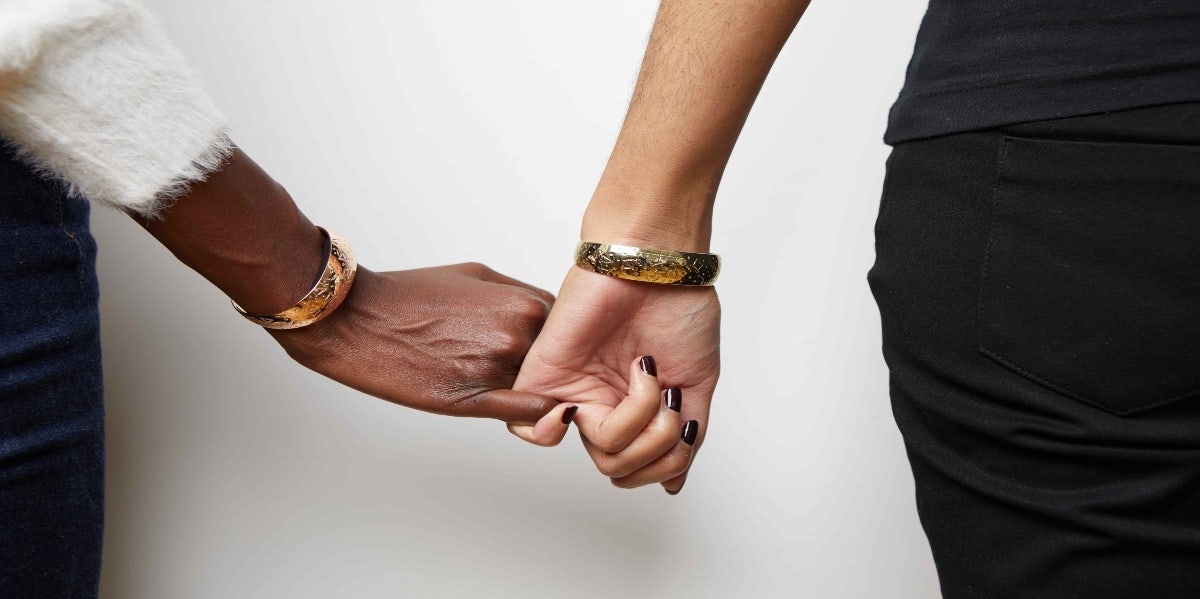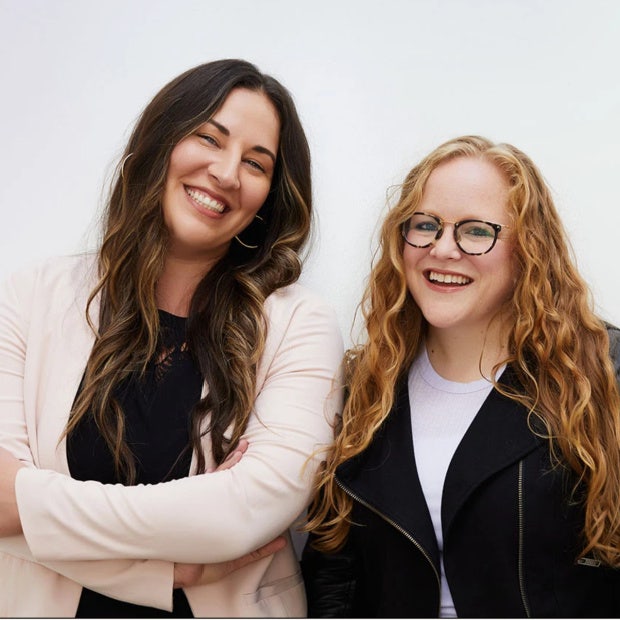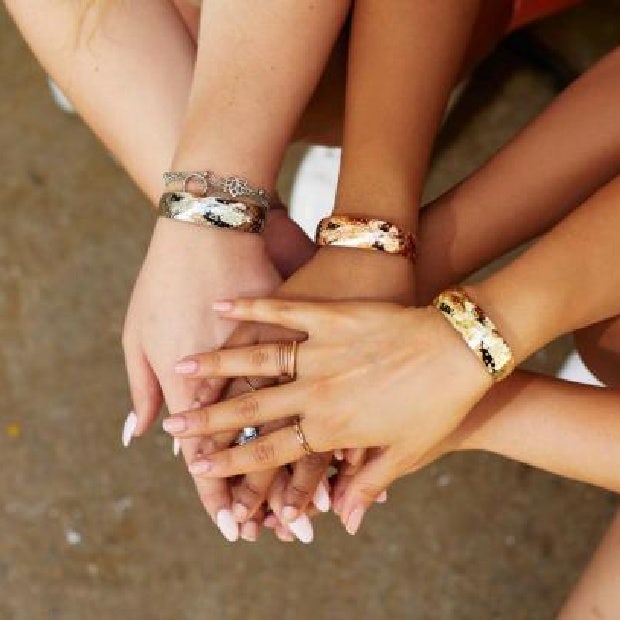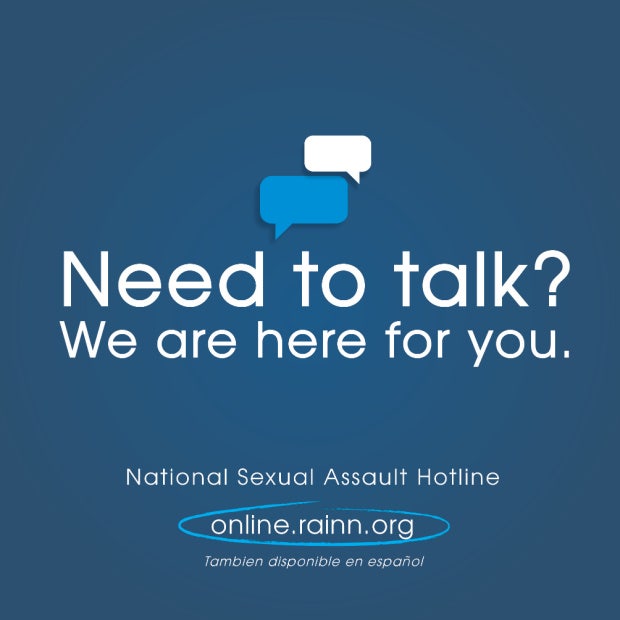Bracelet Created By Assault Survivors Could Prevent An Attack With Just The Touch Of A Button
The founders of Flare jewelry talk to us about what women need to feel safe in situations.
 Flare
Flare Women of all ages know the dangers of simply existing while female.
Walking home at night, going to a party with friends, or just setting a drink down can turn into a terrifying, traumatic, dangerous, and possibly even fatal incident within moments.
Girls are raised to know this information from a very young age. Yet when the unthinkable happens, women are shamed into thinking they should have acted sooner, called for help or simply rejected the perpetrator's unwanted advances.
According to the World Health Organization, nearly one in three women worldwide will experience sexual and/or physical violence, yet very few products made in the personal safety industry are designed to help prevent gender-based crimes.
In a society that has normalized the frequency of sexual harassment, assault, and abuse, women are conditioned to take their safety into their own hands — without being given the tools to do so.
All this was made frighteningly apparent to Quinn Fitzgerald and Sara de Zarraga, founders of safety bracelet company Flare, when they set out to design tech-enabled jewelry that would help users escape unsafe and uncomfortable scenarios at the touch of a button.
Fitzgerald and De Zarraga are both sexual assault survivors whose mission to design a tool they wish they'd at the time of their assaults began when they met at Harvard Business School.
Since then, they have revolutionized female safety-tech with a transformative approach to personal safety.
 Photo: Flare
Photo: Flare
Fitzgerald spoke to us about some of the stigmas and concerns women face in situations of assault and how we need to rethink safety.
Misconceptions about how assault occurs leave women inadequately provided for by the safety industry.
When women find themselves in dangerous situations, it isn't always possible or helpful to blow a whistle, call the police, shout for help, or use pepper spray.
“Unlike the stereotypes, we were not attacked by strangers in a dark alley,” Fitzgerald tells us. “Our perpetrators, and the places where the assaults happened, were familiar. Communication broke down, intent was unclear, and we found ourselves second-guessing that weird gut feeling.”
This is the case for many survivors, as assault is most often perpetrated by someone familiar to victims. These situations make acting in self-defense challenging — and potentially dangerous.
Women need to have a tool they can use to quickly and subtly alert others of their situation, or have an easy out they can turn to without escalating whatever unsafe situation is unfolding.
Fitzgerald describes Flare’s bracelets as “a modern solution to counter the male-created, antiquated safety products that often do more harm than good.”
The bracelets look just like a fashion accessory but sync with an app that allows the user to set up unique, customized responses to maximize their safety.
 Photo: Flare
Photo: Flare
Subtly placed buttons on each bracelet send a message and your GPS location to emergency contacts of your choice or to 911.
The bracelet can also send a call through to your phone so you can leave an uncomfortable situation under the guise of needing to take a call.
Fitzgerald’s own experience informed much of the development of Flare but the contributions of other women have revealed the extent to which women are neglected by the products supposedly designed for them.
“We talked to thousands of women about their experiences because what was really apparent to us was the personal safety industry wasn't talking to women about what safety looks like for them,” Fitzgerald says.
These conversations allowed Fitzgerald to focus Flare’s efforts on reconciling women’s desires to live freely with their fears about the factors inhibiting female agency.
Women shouldn’t have to edit their every move just to feel safe.
For Fitzgerald, De Zarraga and other survivors, reclaiming the personal freedom so often denied to women has been crucial to living an unrestricted life.
Fitzgerald explains, “We were tired of having people tell us to hold back, to not go to a conference or event, to be careful of what we say, and more — all in the name of safety.”
Conversations around female safety often involve telling women what not to do, which seeks only to stifle female autonomy in a similar way to assault.
“To us, safety is not about fear, it is about agency, confidence, and control,” Fitzgerald says. “[It’s about] bringing our full selves to every situation, speaking up knowing you have a backup plan in case someone blows up in your face, having the power to go after all of our goals, and so much more.”
Given the range of abuses women are subjected to, it is almost impossible to avoid situations where assault might happen.
Thus, Flare gives women the peace of mind of knowing they have options if situations take an unwanted turn.
The nuances in how assault occurs call for a shift in how we think about safety.
Fitzgerald stresses that Flare was designed with an awareness that any situation where a woman feels even slightly uncomfortable is worth preventing.
“Not every situation needs to result in calling 911, and we created Flare with this in mind, providing users with other ways to control their personal safety,” she says. “Flare offers options to act in any level of situation, whether that’s getting away from unwanted attention or calling for backup.”
Other attention-grabbing products with alarms or weapons are typically designed for worst-case scenarios, but Flare allows its users a means of escape before a weapon becomes necessary.
Recent updates to the bracelet line have expanded into more gender-neutral designs as the company understands safety is not just a female issue.
“Knowing what we do about safety affecting the LGBTQ+ community in disproportionate ways, it's important to us that we reach people across the gender spectrum,” Fitzgerald says.
Women walk a fine line between protecting themselves and contributing to a culture of victim-blaming.
It is one of the great dichotomies of a business like Flare — how do you give women safety tools without perpetuating the notion that victims are the ones who must prevent assault?
Fitzgerald acknowledges that meaningful progress cannot happen until more work is done to prevent people from perpetrating these crimes. But, until then, we still need tools to help victims.
“You cannot talk about Flare without addressing how terrible it is that a product like this needs to exist in our society,” she says. “Historically, safety companies have claimed or insinuated that they have the solution to safety. That is incredibly damaging.”
Flare doesn’t claim to solve safety concerns but instead seeks to add a meaningful security option to combat them.
Counterintuitive to typical plans for business growth, Fitzgerald’s ultimate goal for Flare is for these bracelets to no longer be necessary for anyone. The company is careful to not market their products in a way that deflects blame onto victims.
Part of the company’s efforts involves working with a range of assault prevention and aftercare organizations to tackle this problem from all angles with the goal of creating a safer world for everyone.
Fitzgerald tells us, “Our mission is simple: to create a world where Flare is not needed.”
The National Sexual Assault Hotline is available 24/7: Telephone: 800.656.HOPE (4673) Online chat: online.rainn.org Español: rainn.org/es.
Alice Kelly is a writer living in Brooklyn, New York. Catch her covering all things social justice, news, and entertainment.


